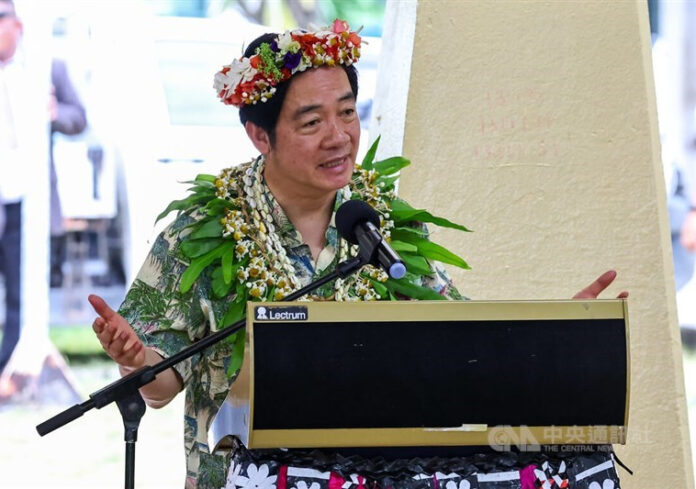Introduction
President Lai Ching-te’s recent diplomatic tour to the South Pacific underscored Taiwan’s commitment to strengthening democratic alliances in the region. From November 30 to December 6, Lai visited Taiwan’s three South Pacific allies: the Marshall Islands, Tuvalu, and Palau, while also stopping over in Guam and Hawaii, which are U.S. territories.
The visit was centered on building stronger ties with democratic nations and reinforcing Taiwan’s role in maintaining regional peace and stability.
Aims of the Pacific Tour: Building Stronger Alliances
The overarching theme of Lai’s tour, “Prosperous Austronesia, Smart Sustainability,” highlighted Taiwan’s dedication to both democratic governance and sustainable development. Presidential Office spokesperson Karen Kuo emphasized that the trip exemplified Taiwan’s strategy of engaging the world through democratic alliances.
This initiative strengthens Taiwan’s role within the first island chain of the Indo-Pacific and enhances its global standing amid the increasing influence of China and Russia in the region.
Key Elements of the Tour
1. Taiwan’s Visibility and Strategic Importance
Lai’s visit reaffirmed Taiwan’s central position in the Indo-Pacific. During a stopover in Guam, U.S. House Speaker Mike Johnson highlighted Taiwan’s vital role in the United States’ Indo-Pacific strategy. This underlines Taiwan’s importance as a democratic beacon in the region.
2. Strengthening Defensive Capabilities
Throughout the trip, President Lai committed to bolstering Taiwan’s defense systems, ensuring that the country remains resilient against any external pressures. This message of security and self-reliance resonated throughout the discussions.
3. Building Regional Democratic Alliances
Lai’s efforts to foster stronger diplomatic ties with countries such as the U.S., Japan, Australia, and Taiwan’s South Pacific allies were a cornerstone of the tour. This commitment emphasizes Taiwan’s role in promoting regional peace and maintaining a stable, rules-based order in the face of rising geopolitical tensions.
4. The Taiwan Strait as a Global Security Issue
Lai’s visit also highlighted the growing significance of the Taiwan Strait in global security. The tour emphasized the need for a unified democratic response to the challenges posed by China and Russia’s encroachment in the region.
The Strategic Importance of the Indo-Pacific
The Indo-Pacific region, often described as the “global security community,” has seen increasing efforts from China and Russia to shift the regional balance of power. Taiwan’s efforts to strengthen ties with democratic nations and uphold peace within this crucial region have never been more urgent. Lai’s trip was a reminder that the stability of the Taiwan Strait is not only Taiwan’s concern but a challenge shared by all democracies.
Future Prospects: Taiwan’s Role in the Global Community
The trip also set the stage for Taiwan to continue playing a pivotal role in regional affairs. Through democratic alliances, Taiwan aims to contribute to a prosperous and peaceful Indo-Pacific. The tour served as a reaffirmation of Taiwan’s unwavering commitment to democratic values and regional stability.
Table: Key Stops and Significance of Lai’s Tour
| Date | Location | Significance |
|---|---|---|
| Nov 30 – Dec 2 | Marshall Islands | Strengthened diplomatic ties, promoting sustainable development. |
| Dec 3 – Dec 4 | Tuvalu | Solidified commitment to democratic values and security cooperation. |
| Dec 5 – Dec 6 | Palau | Furthered Taiwan’s role in regional peace and democratic unity. |
| Stopovers | Guam, Hawaii | Highlighted Taiwan’s strategic importance in U.S. Indo-Pacific policy. |
Frequently Asked Questions (FAQs)
Q1: What was the main purpose of President Lai’s trip to the Pacific?
A1: The main goal was to strengthen democratic alliances with Taiwan’s South Pacific allies and emphasize regional peace and stability through joint efforts.
Q2: How did the U.S. respond to Taiwan’s efforts in the region?
A2: U.S. House Speaker Mike Johnson emphasized Taiwan’s central role in the Indo-Pacific, affirming its strategic importance to U.S. policy.
Q3: What message did Taiwan aim to send through this visit?
A3: Taiwan’s message focused on reinforcing democratic values, building stronger regional alliances, and ensuring peace and security in the Indo-Pacific amidst rising external threats.
Conclusion
Taiwan’s continued efforts to foster robust democratic alliances are crucial for regional stability. President Lai’s recent tour further highlights Taiwan’s active role in global security matters and its dedication to the prosperity and sustainability of the Indo-Pacific.
